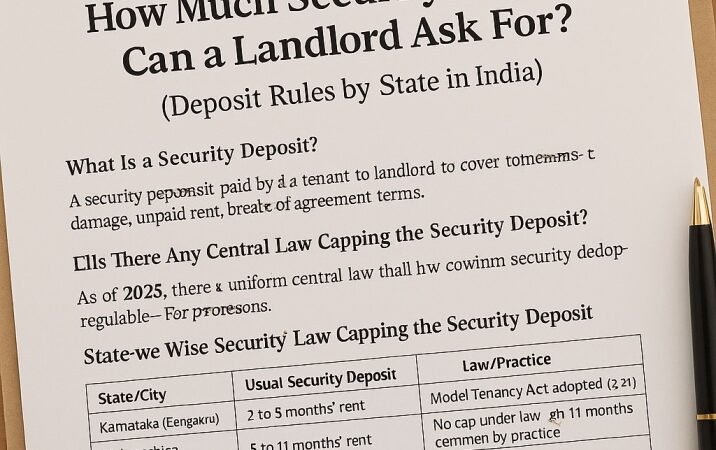🏠 How Much Security Deposit Can a Landlord Ask For? (Deposit Rules by State in India)
When you’re renting a house in India, one of the first financial hurdles you’ll face is the security deposit.
But how much is too much?
And is there a legal limit?
Let’s break it down with facts, state-specific rules, and legal references you can rely on.
📜 What Is a Security Deposit?
A security deposit is an upfront payment made by the tenant to the landlord, usually refundable at the end of the tenancy—subject to damages, dues, or breaches.
This amount is not rent, but a safeguard for the landlord.
⚖️ What Does the Law Say?
The Model Tenancy Act, 2021^1^ is the most comprehensive legislation on rental agreements and security deposits in India.
According to Clause 11(2) of this Act:
- For residential properties:
🔹 The security deposit cannot exceed 2 months’ rent - For non-residential/commercial properties:
🔹 The security deposit cannot exceed 6 months’ rent
✅ This is a central model law, meant to guide states in framing their rental laws.
But not all states have adopted it—state-specific rules still apply.
🗺️ State-Wise Rules on Security Deposit (2025)
| State | Legal Rule or Status |
| Karnataka | Adopted Model Tenancy Act (2021): Max 2 months’ rent for residential property |
| Delhi | Adopted Model Tenancy Act: 2-month cap enforced |
| Maharashtra | Rent Control Act applies: No fixed cap, but practice varies (often 6 months’ rent) |
| Tamil Nadu | Still follows Tamil Nadu Regulation of Rights and Responsibilities of Landlords & Tenants Act, 2017. No fixed deposit cap |
| Telangana | Model Tenancy Act under consideration. Common practice: 6 months’ deposit |
| West Bengal | No formal adoption of Model Act. Local norms apply—ranges from 2 to 11 months’ rent |
| Kerala | Model Act in draft stage. Deposits often 2–6 months’ rent depending on city |
| Uttar Pradesh | Model Tenancy Act implemented: Max 2 months’ rent |
💬 What If a Landlord Asks for More Than the Legal Limit?
- If your state has adopted the Model Tenancy Act, the landlord cannot legally demand more than 2 or 6 months’ rent.
- If not, then the rent control laws or mutual agreement will apply, unless they are unconscionable.
- In any case, we strongly recommend the deposit amount be clearly stated in the rent agreement, signed by both parties.
📝 Is Notarized Rent Agreement Enough?
🔹 No — notarized agreements are not legally enforceable in the same way registered ones are.
🔹 Under Section 17 of the Registration Act, 1908, any lease agreement over 11 months must be registered to be enforceable in court^2^.
💼 What to Do If Your Landlord Insists on Excessive Deposit?
- 💬 Negotiate: Explain the legal limit based on your state’s law
- 📩 Document: Always get the deposit and refund terms in writing
- ⚖️ Legal route: If the landlord refuses to refund, you can initiate a civil suit for recovery under Indian Contract Act, 1872 (Section 73: compensation for breach)^3^
📌 Key Tips for Tenants
- ✅ Ask for written proof of the deposit received
- ✅ Ensure the rent agreement has a clear clause for refund timeline
- ✅ Take video/photo evidence of the property before and after tenancy
- ✅ Avoid cash-only payments for deposits
💼 What Landlords Should Know
- 🧾 Deposits must be returned within a reasonable time after the tenant vacates
- 🧮 Deductions for repair must be justified with actual expense proofs
- 🚫 Excessive deposit demands in Model Act states can lead to legal scrutiny
📚 References
- Model Tenancy Act, 2021 – Clause 11(2): Link to official copy (MoHUA)
- Registration Act, 1908 – Section 17: Compulsory registration for leases above 11 months
- Indian Contract Act, 1872 – Section 73: Compensation for breach of contract or loss from non-refund
📣 Call to Action
At RJ Property Law, we assist clients across India with legal rent agreements, deposit disputes, and tenancy compliance.
📧 Email us at: ranjinijayaram@rjpropertylaw.com
📱 Call or WhatsApp: +91 80884 17193
🌐 Visit: www.rjpropertylaw.com
We’re here to help you rent or lease with confidence.

